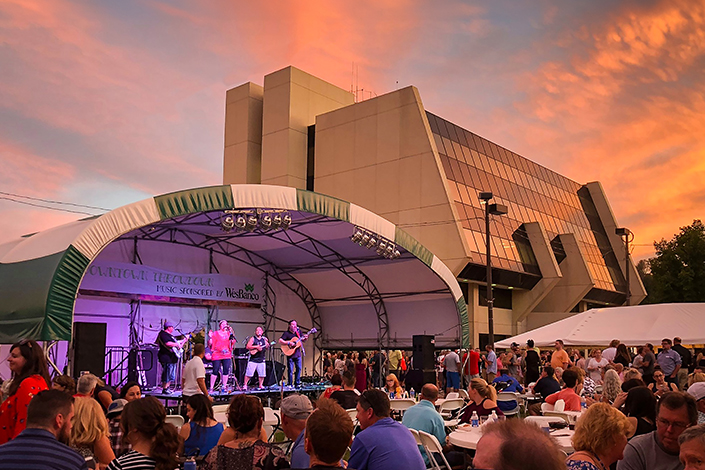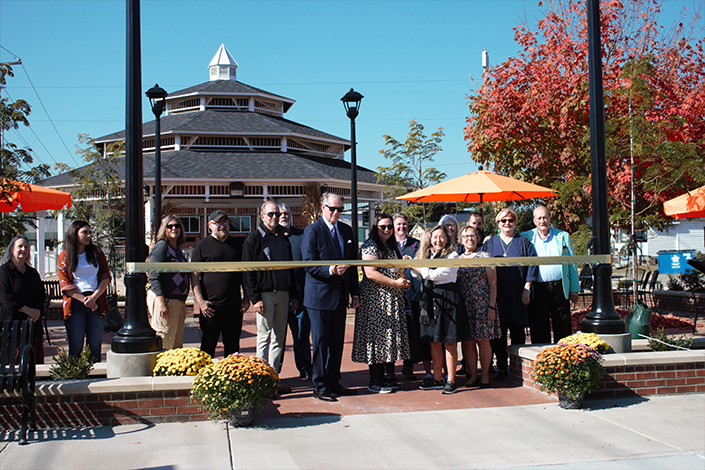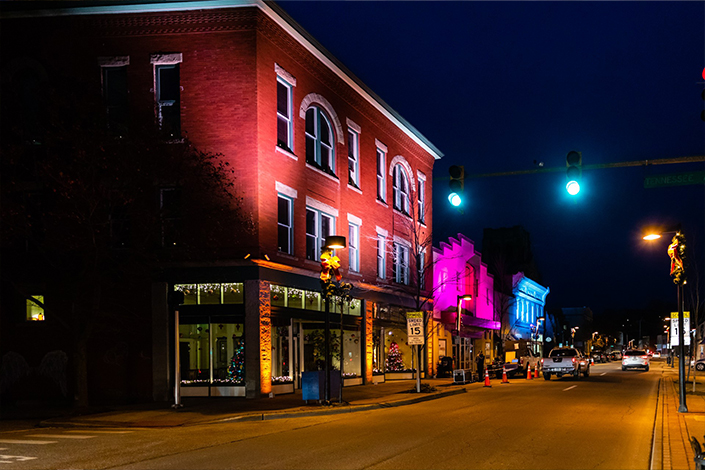By Megan Bevins

Throughout the Mountain State, revitalization efforts are bringing new life to downtown areas, helping transform them into vibrant hubs of community and commerce. Organizations like Main Street Martinsburg (MSM), RenewAll and Charleston Urban Works (CUW) are working to better their downtown areas with help from volunteers, sponsors and organizational partners.
Robby Blair, executive director of MSM, says his organization’s focus involves utilizing the historic element of Martinsburg to promote economic development in the city.
“Our mission is to promote the historic preservation, protection and use of Martinsburg’s historic downtown area,” Blair says. “Our dedicated group of business and property owners, public officials, volunteers and citizens are committed to optimizing every dollar invested in our organization.”
This commitment is evident in the broad spectrum of projects and events that MSM organizes, offering fun-filled activities for tourists and drawing in visitors. While MSM receives funding from city and county municipalities, these events are also a main source of income for the organization.
“We have many cultural events from concerts on the town square to our seasonal street fest, St. Patrick’s Day Celebration, Fall Food Fest and Christmas on Main, all bringing tens of thousands of visitors and locals together to enjoy our downtown area,” Blair says.
MSM’s volunteer committees also work diligently on initiatives that may be less visible but are equally impactful. These include enhancing the downtown district’s appeal through projects such as filling empty tree wells and providing loans to small business owners. The organization also advocates for legislative changes at state and national levels to attract more investment into downtown areas.
Along with revitalizing its downtown, MSM has been a catalyst in improving Martinsburg’s economy and small business community. Over the past three years, MSM has loaned over $37,500 to small businesses through its Low Interest Revolving Fund.
“Small businesses are the backbone of West Virginia,” Blair says. “Big businesses and high-paying employers want to move their businesses to areas that have vibrant communities.”
He also points out that MSM is the oldest main street program in the state and emphasizes its longevity in contributing to the improvement of downtown businesses and quality of life for residents.
Shane Farthing, director of economic and community development for the City of Martinsburg, states that the city collaborates often with MSM and is very pleased with its efforts to revitalize the downtown area. The focus of the City of Martinsburg currently involves transforming underused properties and brownfields into valuable community assets.
The organization is implementing infrastructure improvements like the Frog Hollow Trail, a project aimed at creating a network of recreational trails and a new lake on a former quarry site. Another notable project includes converting an old apple processing campus into a clean-tech manufacturing facility, a development that not only generates jobs and revenue but improves upon a previously abandoned spot.
“The city does all the stuff a city does, but what I do as it relates to economic and community development, is try to generate quality-of-life or the revenue to pursue it within our city’s borders,” Farthing says.
The city has also recently opened a food hall, The Garage, as well as began running a blight abatement matching grant program to assist in beautifying smaller properties while larger initiatives are underway.
The City of Martinsburg is currently collaborating with MSM and the Martinsburg-Berkeley County Convention & Visitors Bureau on Downtown Ambassadors, an initiative that will hopefully increase visitation by connecting local businesses with paid coordinators who can plan events for them when they don’t have the time.
Meanwhile in Huntington, Lauren Kemp serves as the executive director of RenewAll, an ON TRAC organization dedicated to neighborhood revitalization in the city.
Being part of ON TRAC means that the organization is working toward becoming an official Main Street but has not gained the designation yet. RenewAll is unique, however, because despite being an ON TRAC community, it hosts a full-time staff, owns property in the district and has a broad focus on the West Huntington neighborhood.

“The West Huntington neighborhood features the Central City Business District, a historic industrial town that is now part of the City of Huntington,” Kemp says. “RenewAll aims to bring new resources and connect people so that development projects benefit local people and contribute to a better quality of life.”
RenewAll recently transformed Central City Gazebo Park from a barren lawn into a lush public space equipped with trees, café tables and upgraded utilities for running food trucks. It is also putting the final touches on a public art installation, supported by a T-Mobile Hometown grant and featuring two kinetic sculptures by artist Becky Borlan.
The organization also supports local businesses through coordinated promotions and support of events and improvement projects. In 2020, it opened the Central City Museum, which highlights the area’s history and preserves its artifacts.
To help bring awareness to small businesses, RenewAll hosts a weekly newsletter as well as media to introduce them to potential guests.
“West Virginia has the potential to grow, and RenewAll is working to strengthen the West Huntington community so people have great places to live, work and visit,” Kemp says. “Through a combination of entrepreneurship and tourism development, RenewAll is making an impact on West Virginia’s economy.”
In Charleston, CUW, which emerged after a rebranding of Charleston Main Streets to better reflect the needs of small businesses, serves the East End and West Side business districts. CUW focuses on four objectives: business development and advancement, marketing and development, public space enhancement and increased engagement. Each of these categories contains its own working group.
CUW is currently working on the West Side Gateway Lighting Initiative, which will revolutionize public lighting in the area with funding from several foundations and the Appalachian Regional Commission. The organization also focuses on enhancing public spaces and supporting business development through initiatives like its new business and property owner survey, which will help shape long-term work plans and goals through 2027.
Ric Cavender, executive director of CUW, emphasizes the economic impact of its events, which draw visitors from across the country and generate substantial revenue for local businesses through increased tourism.
“Our fundraising events have brought in people from 24 states since 2015—these people spend a lot of money on hotels, local restaurants, breweries and retail sites,” Cavender says.
CUW received municipal funding from the City of Charleston, as well as through fundraisers Foam at the Dome, OktoberWest and the Capital Crawl. CUW also works with over 100 corporate sponsors and receives grant funding.
As these organizations’ initiatives continue to develop, they paint a promising picture for the future of West Virginia’s urban sector.









